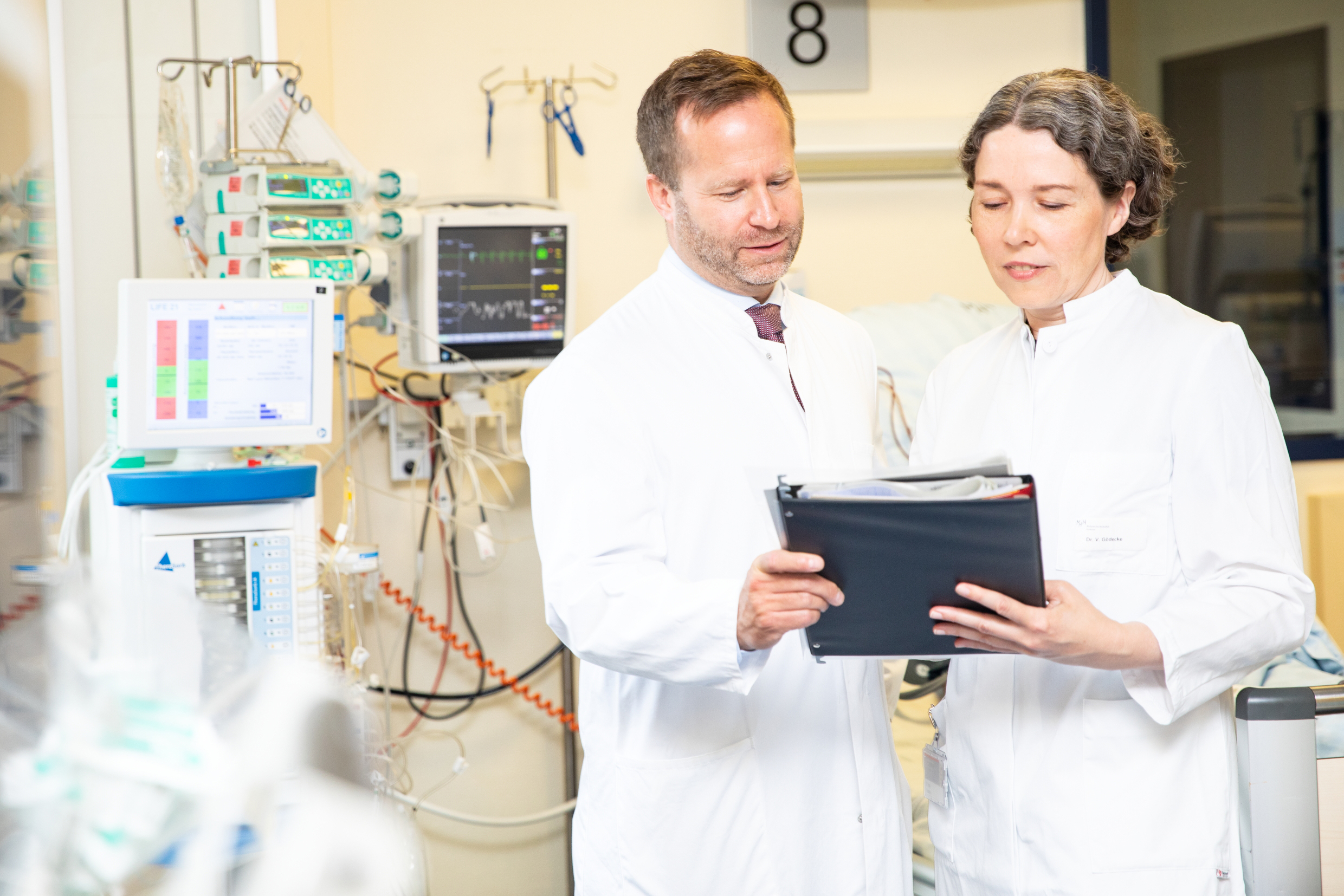Chronic fatigue syndrome (CFS) is a heavy burden. The "EXTINCT post COVID" project is investigating the effectiveness of apheresis therapy and is seeking participants for a study.

Want to prove whether blood purification by immunoadsorption can improve the fatigue symptoms of post-COVID sufferers: Professor Dr Kai Schmidt-Ott and Dr Vega Gödecke. Copyright: Karin Kaiser / MHH
4. July 2023
The Corona pandemic seems to have been overcome; mandatory masks and other restrictions have largely been abolished. However, about one in ten people continue to suffer the consequences of a Corona infection for longer: persistent fatigue, exhaustion, heart problems, poor concentration and shortness of breath. According to estimates by the German Society for Nephrology (DGfN), this affects around two million people in Germany. If the symptoms persist for more than twelve weeks after the onset of the SARS-CoV-2 infection and other causes can be ruled out, it is called post-COVID syndrome. In particular, severe fatigue, chronic fatigue syndrome (CFS), is a major challenge for patients and the healthcare system. The cause is not yet clearly understood. "However, there are indications that a dysregulated immune response may be involved in its development," says Dr. Vega Gödecke, senior physician at the Clinic for Renal and Hypertension Diseases at Hannover Medical School (MHH).
One therapeutic option is therefore to remove the antibodies from the blood by so-called immune adsorption. In some individual cases, an improvement of fatigue symptoms after blood washing has been reported. However, scientific proof is still lacking. The MHH clinic now wants to make up for this. In cooperation with other internal departments and the Foundation of the University of Veterinary Medicine Hannover, it is investigating the therapeutic efficacy of immunoadsorption in post-COVID sufferers. The study "EXTINCT post COVID" is funded by the state of Lower Saxony within the framework of the COVID-19 Research Network Lower Saxony (COFONI) for two years with approximately 800,00 Euros.
Affected persons with moderate to severe symptoms sought
The DGfN has been calling for controlled studies on the benefits of the therapy for some time. "In contrast to previous case studies, our approach meets precisely this requirement and thus fulfills the scientific requirements for proof of efficacy," emphasizes clinic director Professor Dr. Kai Schmidt-Ott. "To this end, in the first step we will interview the participants in detail and collect and evaluate preliminary findings. This will include determining the concentrations of antibodies circulating in the blood, which, according to previous studies, may be associated with the development of post-COVID syndrome. In this way, the researchers aim to record the baseline situation in an objective and scientifically evaluable manner. "Only people with moderate to severe CFS will be included in the study. These are severely restricted in their daily lives, particularly by fatigue symptoms, but also by concentration disorders and other symptoms. This is not only a great burden for the patients, but also for the social community, since the patients are often torn out of their working lives by the disease.
In a second step, all subjects of this well-characterised cohort receive a so-called apheresis on ward 10 of the clinic, with the participation of the acute dialysis team. This method, colloquially known as blood washing, is well established in renal medicine and is used, for example, in severe autoimmune diseases of the kidney or other organs. Antibodies are specifically removed from the blood plasma. The blood purification procedure works in a similar way to dialysis and is performed extracorporeally, i.e. outside the body using special apheresis machines. The purified blood is then returned to the body.
Detecting placebo effects
"However, we only actually remove the antibodies from the blood by immunoadsorption in some of the participants," says Dr. Gödecke. Although the control group apparently undergoes the same mechanical procedure, here the blood is returned to the body unchanged. Participants in the two groups are randomly selected and do not know themselves whether they will be treated in the immunoadsorption or control group. "This allows us to detect possible placebo effects," the nephrologist explains. However, the study is not only intended to provide scientific evidence of whether immunoadsorption can actually improve fatigue symptoms. The researchers also want to gain fundamental insights into the exact disease processes of post-COVID syndrome. "At the moment, there are no laboratory values that allow diagnosis via blood analysis," Dr. Gödecke says. The researchers are looking for biomarkers and want to find out which antibodies are associated with symptoms in post-COVID CFS.
If the study proves that immunoadsorption improves fatigue symptoms, the treatment could also be included in the health insurers' benefits catalog in the future. The suffering pressure is high. "At the moment, there are still many sufferers who, out of desperation, pay for the cost-intensive treatments out of their own pockets without knowing whether they are of any use to them at all," notes Professor Schmidt-Ott. "Our goal is to collect robust data on the efficacy and safety of immunoadsorption in these patients. This will help patients and their treating physicians decide whether to use such procedures in the future. "
Participants sought
The Clinic for Renal and Hypertension Diseases is still offering places for participation in the "EXTINCT post COVID" study. Patients with post-COVID syndrome who suffer from chronic fatigue syndrome are being sought. For more information about the study and conditions of participation, interested parties can contact zse-kontaktformular@mh-hannover.de.